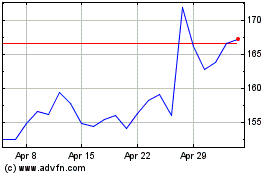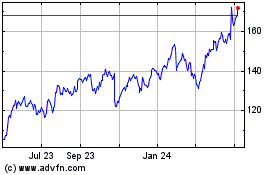By Ryan Tracy and John D. McKinnon
WASHINGTON -- The Justice Department's lawsuit against Alphabet
Inc.'s Google is the government's biggest challenge to U.S.
technology companies in a generation. For many of the company's
longtime adversaries, it isn't big enough.
The antitrust action filed in federal court this week takes aim
at Google's online search and search advertising businesses, with
less attention paid to targeted search products, advertising
technology and other businesses that have long been the source of
complaints in Washington.
Now those critics are pinning their hopes on additional
enforcement actions to broaden the government's claims against
Google, as state attorneys general and the Justice Department
continue probing the tech giant.
Whether, and how much, that scope expands will go a long way
toward determining the impact of government scrutiny on the many
markets where Google operates.
Tripadvisor Inc., which has criticized Google for siphoning off
web traffic from other sites that offer travel services, called the
federal lawsuit a "framework for meaningful action" and pointed to
a concurrent announcement that state-level probes are continuing as
further evidence authorities are seeking to end Google's
"anticompetitive tactics."
Other claims of Google misconduct also weren't a focus, such as
arguments by news publishers over Google's dominance in the market
for displaying ads on non-Google websites, which also wasn't a
central part of Tuesday's lawsuit.
"I'm glad that the Department of Justice has made the start, but
they have started with a very limited issue and, in and of itself,
it certainly won't be enough," said David Chavern, chief executive
of the News Media Alliance trade group, whose members include News
Corp, owner of The Wall Street Journal.
Justice Department attorneys have left open the possibility of
adding more claims, and investigators for both the federal and
state governments have asked questions of participants in markets
not covered in detail in the lawsuit.
Those questions have included Google's dominance in the
machinery for delivering online ads, according to people familiar
with the matter and a list of questions disclosed by the Texas
attorney general's office.
Jonathan Kanter, an antitrust lawyer who represents a number of
companies with antitrust concerns about Google, said his clients
expect further action will be forthcoming.
"Everyone is viewing this as a symphony, not a solo," he
said.
The lion's share of the federal lawsuit focuses on Google's
alleged foreclosure of competition to its general search engine,
including a web of deals with Apple Inc. and others that make
Google the default search on many devices. A case focused on those
issues could help companies with competing search engines, such as
DuckDuckGo and Microsoft Corp.'s Bing.
Google called the Justice Department's lawsuit "deeply flawed,"
saying its search engine faces stiff competition. "People use
Google because they choose to, not because they're forced to, or
because they can't find alternatives," wrote Kent Walker, Google's
chief legal officer, in a blog post.
Alex Okuliar, deputy assistant attorney general in the Justice
Department's antitrust division, told reporters Tuesday that
additional relief measures might be sought beyond simply stopping
Google's allegedly exclusionary conduct.
Mr. Kanter, the lawyer for Google opponents, noted that a
section describing the harms of Google's conduct was worded
broadly. The language -- "Google's monopoly in general search
services also has given the company extraordinary power as the
gateway to the internet, which it uses to promote its own web
content" -- echoed concerns from Yelp Inc., Tripadvisor and
others.
At another point, the Justice Department quoted Google's chief
economist describing search-result ads and other forms of online
ads as "complementary tools, not competing ones."
That piece of evidence could help prosecutors support a separate
antitrust claim targeting Google's broader advertising businesses
because such a case may involve drawing a distinction between
different online advertising markets.
Meanwhile, two groups of state attorneys general have been
considering lawsuits against the internet giant, one over its
search practices and the other over its dominant position in online
advertising.
If the states decide to move forward, a possible lawsuit would
likely address more issues than the Justice Department case,
according to people familiar with the matter.
"Ours, I believe, will be a little bit broader," one of the
people said. The states involved in the search coalition include
Arizona, Colorado, Iowa, Nebraska, New York, North Carolina,
Tennessee and Utah.
The other state coalition, led by Texas Attorney General Ken
Paxton, is investigating Google's ad-tech dominance and is likely
to file suit within weeks. Its case likely would address at least
some of the concerns raised by publishers as well as other
businesses, according to a person familiar with the matter.
Some or all of the state cases could be consolidated with the
Justice Department action in federal court in Washington. Members
of the state coalition including Colorado and New York released a
joint statement Tuesday saying they planned to conclude parts of
their investigation in the coming weeks and that if a state lawsuit
is filed, they would seek to join it with the federal action.
"We anticipate we will be working with them going forward in the
litigation phase," said one person familiar with the state
investigations.
Google's Mr. Walker said the federal lawsuit's consequences
would be bad for consumers. If successful, he said, it "would
artificially prop up lower-quality search alternatives, raise phone
prices, and make it harder for people to get the search services
they want to use."
Write to Ryan Tracy at ryan.tracy@wsj.com and John D. McKinnon
at john.mckinnon@wsj.com
(END) Dow Jones Newswires
October 22, 2020 08:14 ET (12:14 GMT)
Copyright (c) 2020 Dow Jones & Company, Inc.
Alphabet (NASDAQ:GOOGL)
Historical Stock Chart
From Mar 2024 to Apr 2024

Alphabet (NASDAQ:GOOGL)
Historical Stock Chart
From Apr 2023 to Apr 2024
